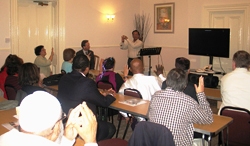![]()
The Words of the Marsh Family
|
|
The Words of the Marsh Family |

Commemorating the UN International Peace Day an event was held in the Universal Peace Federation (UPF) HQ in 43 Lancaster Gate on the 19th of September. A presentation on the efforts of UPF to support the United Nations in various initiatives, especially to promote dialogue between the different religions of the world, was made by Robin Marsh. There followed a number of contributions from the audience who came from many different faith backgrounds. Jack Corley, Chair of UPF in the UK, in concluding remarks spoke of the vision and continuing passion of UPF's Founder, the 92 year old Father Moon to build a peaceful world. Photo link
Rev. Jomo O'Coco of the Brotherhood of Cross and Star, commented on the ignorance of political leaders who did not understand the importance of religious leaders views on contemporary issues. Sue Pattison emphasized that the leadership of our nation should give a better example to our youth. Ahmadiyya Muslim Association senior figure, Mr. Nasir Khan, explained the policy of Humanitad to deliver humanitarian aid to people in need regardless of their faith affiliation. Sheikh Hojjatt Ramzy, the Chair of the Muslim Council of Britain's Education Committee, gave the concluding prayer.
Robin Marsh explained that in the ten years since 9/11 there have been great tensions between the Islamic and Christian civilizations. There are other religious and non-religious based tensions between different civilizations in various parts of the world. Father Sun Myung Moon, Universal Peace Federation's (UPF) founder, seeks to promote the understanding of humanity as one family under God. He saw from the 1970s the need for dialogue between different faiths and civilizations and sought to create institutions that would facilitate those forums for that dialogue and for greater mutual understanding. This culminated in the inauguration of the UPF in its role to support the United Nations and the promotion of dialogue by an inter-religious council within the UN structure and national Parliaments or Assemblies.
UPF perceives dialogue and human interaction with your 'Neighbor' as the most fundamental step towards building a world of peace. This means to find a way for people of all backgrounds, all cultures, faiths and races to meet each other and learn about the "other". UPF has two major principles in this respect
1. To live as one family of humanity under God
2. Is to live in service of others
UPF brings people together from varied backgrounds and offers an equal platform for all to share their values, the tenets of their faith also have an opportunity to speak about their dream and vision for building a world of peace. In so doing we soon begin to respect and further love one another as we together discover our common universal God given spiritual values.
'For years I have called for a world where all religions live together as one, all races live as one, and all nations exist as one. For thousands of years history has seen the continuous increase of divisions. Each time a different religion was adopted or a new regime came into power, more boundaries were drawn and wars were fought. Now, however, we live in an age of globalism. For the sake of the future we must become one.'
The United Nations has done much for world peace. More than sixty years after its founding, however, the United Nations is losing sight of its original purpose and is now an organization that works for the interests of a few powerful countries. The U.N. was created to solve the conflicts that arise in the world, so it must put the world's interests before the interests of one side or the other. It only leads to further conflict when a powerful country insists on its own way and uses force to pursue it. Unfortunately, the U.N. today is unable to do much about such situations.
In this light, I have proposed a restructuring of the United Nations as a bicameral institution. In addition to the General Assembly there would be a religious, or cultural, assembly or council. This body would consist of respected spiritual leaders in fields such as religion, culture, and education. The members of this inter-religious assembly would need to demonstrate an ability to transcend the limited interests of particular religions and cultures and to speak for the spiritual and moral purposes of all humanity.
I maintain that the two chambers,
working together in mutual respect and cooperation, will be able to
make great advances in ushering in a world of peace. Some may oppose
this, saying, "Why should religious people become involved in
world affairs?" My answer is that the world today is in a period
when the participation of religious people is crucial. Those who have
achieved deep self-awareness through religious practice are needed
now more than ever. It is only truly religious people who can stand
up to the unrighteousness and evil of the world and practice true
love. It is only when the knowledge and experience of political
leaders are combined with the wisdom of inter-religious leaders that
the world will be able to find the path to true peace. Again today I
set out on my path with renewed determination to achieve that goal.
My prayer is that every person on earth will be reborn as a
peace-loving global citizen, transcending barriers of religion,
ideology, and race.'
(As a Peace Loving Global Citizen by Rev. Dr.
Sun Myung Moon page 340)